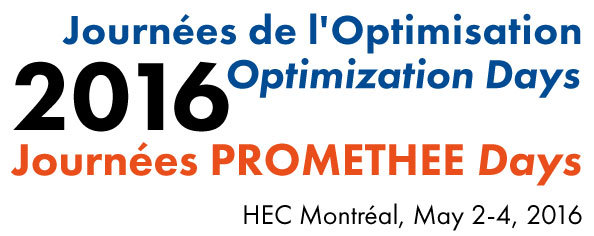
2016 Optimization Days
HEC Montréal, Québec, Canada, 2 — 4 May 2016

WA8 Control of Energy Systems
May 4, 2016 10:30 AM – 12:10 PM
Location: St-Hubert
Chaired by Jérôme Le Ny
4 Presentations
-
 10:30 AM - 10:55 AM
10:30 AM - 10:55 AMCollective target tracking control in energy systems with constrained inputs under mean field game framework
In this research, we propose a decentralized control mechanism under mean field game framework to manage the aggregation of a large population of heating devices to track a desired target, where each device generates its optimal control locally and respects certain control constraints. The approach is illustrated by numerical studies.
-
 10:55 AM - 11:20 AM
10:55 AM - 11:20 AMOptimal control of teams with exchangeable agents: A design methodology for demand response
A desirable feature of decentralized control strategy for demand response is that exchanging two identical agents (e.g. residential loads or EVs) does not affect the optimal strategy. We develop a solution methodology for team optimal control of such systems with exchangeable agents and show how this methodology may be applied to demand response.
-
 11:20 AM - 11:45 AM
11:20 AM - 11:45 AMDiscrete-event systems-based power admission control of thermal appliances in smart buildings
The present work addresses the admission control of thermal appliances in the context of smart buildings. The scheduling of thermal devices operation is formulated in the framework of discrete-event systems (DES), which allows for the modeling and design of admission control to be carried out in a systematic manner and ensuring the existence of the feasible scheduling prior to exploring control solutions. Simulation results show a noticeable improvement on peak power reduction.
-
 11:45 AM - 12:10 PM
11:45 AM - 12:10 PMOptimizing the design and operation of residential photovoltaic plus battery systems
This presentation uses a case study based on a typical Canadian house located in Ontario to assess the potential of optimizing grid-tied photovoltaic (PV) systems with battery storage. These systems have been introduced on the market recently to combine on-site renewable energy production with resilience against black outs. Their design is different from typical grid-tied systems (which do not include batteries) and from stand-alone (off-grid) systems. They also offer the potential to use time-of-use electricity tariffs to deliver additional cost savings to the house owner. The presentation will describe the case study and the optimization process that was implemented.
